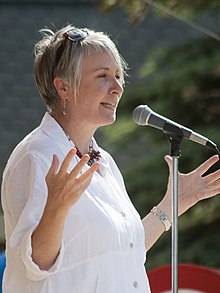Minister of Labour (Canada)
| Minister of Employment, Workforce Development and Labour of Canada | |
|---|---|
| Department of Employment and Social Development | |
| Style | The Honourable |
| Member of | |
| Appointer | Governor General of Canada |
| Term length | At Her Majesty's pleasure |
| Inaugural holder | William Lyon Mackenzie King |
| Formation | 2 June 1909 |
| Salary | $251,900 (CAD) |
| Website | www.hrsdc.gc.ca |
The Minister of Employment, Workforce Development and Labour, previously the Minister of Labour (French: Ministre du Travail), is the minister of the Crown in the Canadian Cabinet who is responsible for setting national labour standards and federal labour dispute mechanisms. Most of the responsibility for labour belongs with the provinces; however, the federal government is responsible for labour issues in industries under its jurisdiction.
The Minister of Labour and Housing is responsible for HRSDC's Labour Program and thus is responsible for the Canada Labour Code, the Employment Equity Act, the Federal Mediation and Conciliation Service, as well as the implementation of health and safety legislation. Other acts the minister retains responsibility for include the Fair Wages and Hours of Labour Act, Government Employees Compensation Act, and Merchant Seamen Compensation Act. The minister is also responsible for the Strategic Policy and International Labour Affairs (SPILA) Directorate, which focuses on workplace trends and changes, including work-life balance and the reformation of employment relationships, and the Workplace Information Directorate (WID), which provides information on workplace conditions, trends, and innovative practices through direct personal services, electronic means, and various publications, including the Workplace Gazette and the Wage Settlements Bulletin.
The Department of Labour was created in 1900. Previously, the responsibility for labour affairs was handled by the Postmaster General.
The Department of Labour was created in 1900 through the efforts of Postmaster General William Mulock and William Lyon Mackenzie King, becoming, respectively, the first minister and deputy minister. Until June, 1909, the Postmaster General acted as Minister of Labour. In 1996, the Department of Labour was abolished, but the ministerial position continued within Human Resources Development Canada from 1996 to 2003 and Human Resources and Social Development Canada from 2003 to date.
...
Wikipedia

